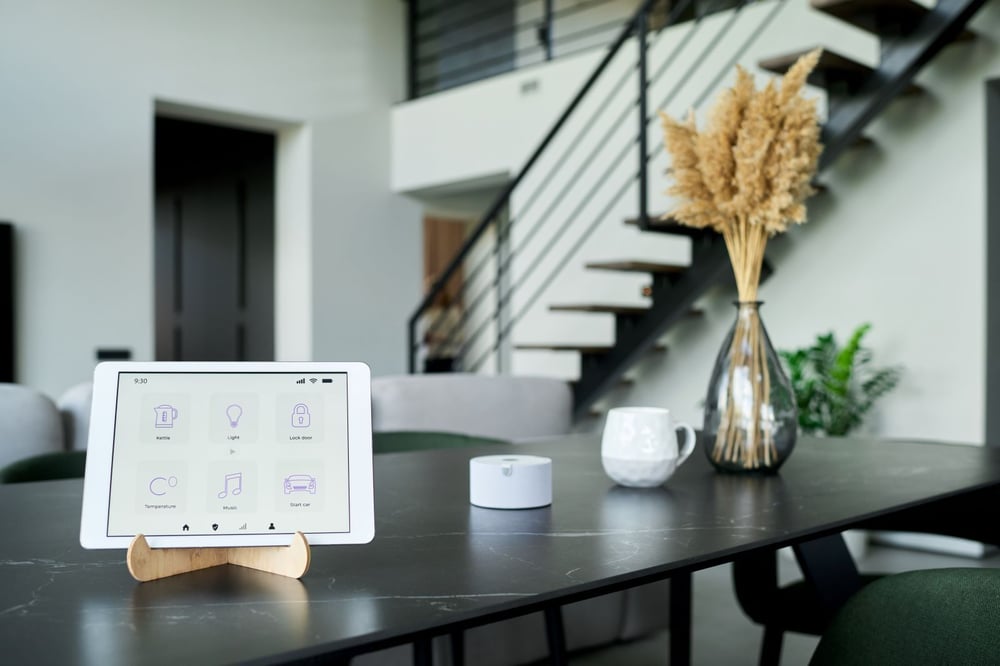How Smart Technology is Shaping Abu Dhabi's Luxury Real Estate
Summer in Abu Dhabi means 45°C heat and air conditioning bills that can be eye-watering. It's a city where cooling a home often accounts for about 65-70% of household electricity use in the Gulf, where water is precious, and where the government has committed to net zero by 2050. Smart technology isn't a luxury add-on here – it's how developers are solving real problems.
The change has been gradual but significant. Air conditioning used to run continuously whether anyone was home or not. Now sensors and automation respond to actual use. Residents get comfortable homes without punishing energy bills. Investors get properties built to standards that won't be outdated when environmental regulations tighten further.

Building Efficiency In From Day One
In leading new communities, developers are building homes that are smart-ready from day one. Aldar's recent projects (Noya Viva, Yas Acres) are designed for efficient cooling and can integrate with smart controls from the start. When cooling costs dominate your utility bill, this stops being a nice feature and becomes essential infrastructure.
Saadiyat Grove shows what this shift looks like at neighbourhood scale. Aldar partnered with Siemens to build the UAE's first cloud-based smart district management system. It monitors building performance in real time, tracking energy and water use to catch inefficiencies before they balloon into expensive problems. The system doesn't just collect data – it identifies patterns, flags anomalies, and helps property managers respond before small issues become headaches. Aldar aims to cut energy consumption by 20% across 80 assets, and smart monitoring is how they'll get there.
The shift reflects a broader change in how developments get planned. Ten years ago, sustainability features were marketing points. Today, they're baseline requirements. Buyers expect them. Regulations demand them. Developers build them in because the alternative – retrofitting older buildings to meet new standards – costs more.
Read More: Property Insurance in Abu Dhabi
The Cooling Cost Reality
Traditional AC systems run at full capacity all summer, regardless of whether rooms are occupied. Smart systems adjust based on who's actually home and what the temperature is outside, learning your patterns over time. They know when you typically arrive home from work, when bedrooms get used, and which rooms stay empty during the day.
The savings aren't trivial. Peak-summer electricity costs for villas can be substantial. Given cooling's 65-70% share of household electricity use in the Gulf, a 20-30% efficiency gain translates to material savings over a few years. For families living in these homes long-term, efficiency becomes a genuine financial consideration, not just an environmental talking point.
District cooling – now common in masterplans – performs best with digital monitoring at scale. On Yas Island, for example, Tabreed supplies district cooling (Yas Creative Hub) under long-term concessions, illustrating how neighbourhood-level systems reduce losses versus building-by-building cooling.
Water Scarcity Drives Innovation
Water management adds another layer. Abu Dhabi typically records well under 100mm of rain a year – some datasets show around 40-80mm annually. Every drop counts, particularly for villa communities with gardens.
New developments include irrigation systems that adjust watering schedules based on weather forecasts and soil moisture sensors embedded in the ground. If rain is predicted, watering pauses. If soil moisture hits target levels, systems hold back even when schedules say water. Leak detection sensors catch problems early, alerting property management before a minor issue becomes a flood and a massive water bill.
Community-wide monitoring helps manage resources more efficiently across entire neighbourhoods. Property managers can see usage patterns, identify outliers, and address problems at scale rather than waiting for individual complaints.
Properties that demonstrate lower water consumption align with environmental standards that will only get stricter. Homes built with water efficiency embedded won't need costly retrofits as regulations evolve. For buyers thinking long-term, this is significant.
Read More: Things to Know About Abu Dhabi Property Market
Solar Panels and EV Charging
Abu Dhabi gets sunshine in abundance – around 3,400-3,500 hours annually, exactly the conditions solar-ready homes are built for. New villa developments include solar panel preparation or full installation, with smart inverters that optimise energy use throughout the day. The systems learn household consumption patterns, storing excess energy or feeding it back to the grid during peak production hours.
EV charging is scaling rapidly emirate-wide. In May 2025, Abu Dhabi Mobility announced 1,000 new public chargers at 400 locations under the Charge AD brand, with standardised tariffs. The agency also reported over 15,000 EVs registered in Q1 2025 (about 60% year-on-year growth) and is targeting 50% EV share on Abu Dhabi's roads by 2040. Many new villa specs include EV-ready electrical capacity or on-plot charging options.
The cost savings hit immediately. Solar panels in Abu Dhabi's climate can offset a significant portion of electricity costs, particularly valuable given how much energy cooling demands. Building this infrastructure in from the start also means less worry about expensive retrofits as environmental regulations tighten and EV adoption accelerates.
Security That Actually Makes Life Easier
App-based access and digital parking management have arrived in newer luxury towers, including on Al Maryah Island. In April 2025, Abu Dhabi's Department of Culture & Tourism, working with the federal ID authority, announced a phased roll-out of facial-recognition check-in across hotels, now in pilot at select five-star properties and expanding. In residential towers, app-based systems are becoming more common. The appeal is practical – no lost keycards, no waiting for security to verify visitors, no tracking down spare keys for family members.
Families like remote visitor management and delivery tracking. You can grant temporary access to housekeepers or contractors from your phone, see when packages arrive, and monitor who enters and exits your property. Property managers find digital systems reduce friction and speed up maintenance responses. When residents can report issues through apps with photos and exact locations, problems are resolved faster.
Read More: Can Foreigners Buy Property in Abu Dhabi
When Automation Disappears
At the top end of the market, smart technology works best when you don't notice it. High-end homes feature discreet automation – smart glass that tints automatically as the sun moves, climate systems that respond to external conditions without you touching a control, lighting that adjusts throughout the day to match natural light.
International buyers relocating from temperate climates particularly value automated climate management. Coming from London or Singapore to Abu Dhabi's extreme heat takes adjustment. Homes that maintain comfort automatically, that learn your preferences and anticipate your needs, make the transition easier.
Built for the Long Term
Abu Dhabi's approach to smart real estate follows the same strategy visible across its broader development – integrate technology that addresses actual challenges rather than racing to add advanced features that look good in marketing materials but serve little practical purpose.
Smart homes and data-driven communities respond to the realities of building in one of the world's hottest climates whilst meeting ambitious environmental commitments. Families want lower utility bills and comfortable homes. Investors assess long-term value and regulatory resilience. The technology serves both, solving immediate problems while positioning properties for a future where environmental standards only get stricter.
Where other regional markets chase spectacle and rapid turnover, Abu Dhabi builds for permanence. Smart features align with planning goals – communities that function efficiently in extreme heat, whilst meeting environmental standards that keep tightening. The technology ensures developments built today remain relevant decades from now, delivering comfort and value in a market designed to last.



